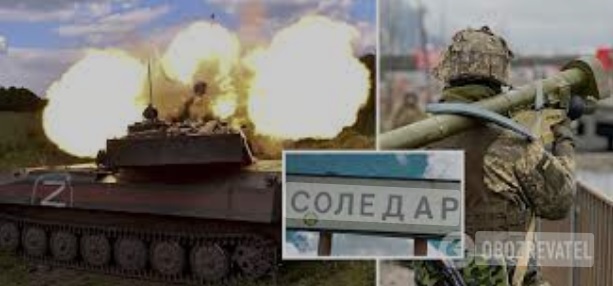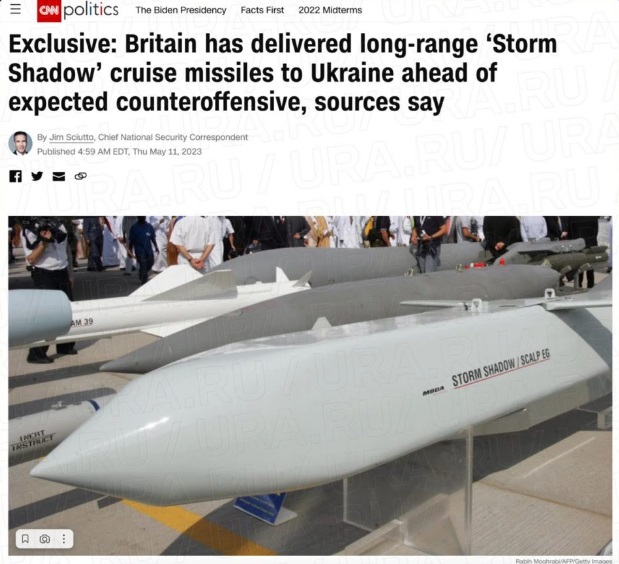
- The Russian Defense Ministry has denied rumors of a large-scale Ukrainian ‘counteroffensive’, saying in a statement delivered on May 11 that most of the frontline appeared to be relatively stable, with the only heavy fighting in and near Artyomovsk, known as Bakhmut in Ukrainian language.
“Reports by certain Telegram channels of ‘breaches of defenses’ in several places along the line of contact are not accurate,” the ministry said. It added that the general situation in the area is under full Russian control.
According to the Russian MoD, the last remaining part of Artyomovsk was being stormed with Russian Air Force and artillery support, while there was an “ongoing battle” to repel the attack of Ukrainian units in the direction of Malo-Ilyinkovka northwest of the city, with “heavy enemy casualties in lives and equipment.”
Eight Ukrainian attacks and three attempts at reconnaissance were repelled on the Donetsk front, the Russian MoD said. Russian forces' efforts to take all of Maryinka and blockade of Avdeevka from where AFU constantly shelling civilians in Donbass are continuing.
Some military activity of AFU took place in Soledar area stretching for nearly 95 km. The Ukrainian formation had nearly 1,000 men and up to 40 tanks. They failed to penetrate Russian defenses during 26 attacks, and sustained heavy losses. Such drive cannot be seen as an ‘offensive”.
Russia has been fully prepared to such ‘offensive’ during which AFU will be totally ruined despite Western military aid to a failed neo-Nazi regime entrenched in Kiev
- British Defence Secretary Ben Wallace has confirmed that his Government is supplying long-range cruise missiles to Ukraine.
CNN previously reported that several Storm Shadow cruise missiles with the range of more than 250 km or 155 miles have already been delivered to AFU. According to Popular Mechanics, it’s unclear whether Ukraine has received fully capable Storm Shadows, or a reduced range model so as to adhere to the MTCR or Missile Technologies’ Control Regime, which ordinarily discouraged export of missiles with a range exceeding 190 miles. Some Western sources claim that their maximum range is 250 miles, or even 350 miles. The weapon was developed in the 1990s by the UK and France. It is typically launched from the air and the sea.

As it stands for today, Kiev actually has a very limited air power and practically does not have any Navy to deliver Storm Shadows ALCMs and SLCMs.
Kremlin spokesman Dmitry Peskov commented on the UK decision to send missiles, pledging that the Russian military will make necessary adjustments to counter the new threat.
- On May 11 Russian Ministry of Foreign Affairs made a strong statement where it outlined that it regards this decision as yet another extremely hostile step made by London aimed at further pumping Ukraine with weapons and leading to a serious escalation of the situation in the area of the Special Military Operation. The transfer of long-range, high-precision missile systems to the Kiev regime clearly confirms the unprecedented level of British involvement in the Ukrainian conflict.
The statement added that having played with geopolitics and striving to establish itself as the informal leader of NATO in the Ukrainian track and an irreconcilable opponent of Russia, the UK is obviously ready to cross any borders and take the conflict to a fundamentally new level in terms of destruction and human casualties.
The document underlined that the Russian side reserves the right to take all necessary measures to neutralize the threats that may arise from the use of British cruise missiles by Ukraine. All responsibility for the consequences of London's destructive activity lies entirely with the authors and perpetrators of this reckless move.
According to unconfirmed, classified Pentagon assessments leaked on a Discord server, Washington believes that such a development could convince Beijing to provide military assistance to Russia.
Russian general public and military experts demanded that Moscow should make a tough response to London for the delivery and the use of such weapons by Kiev who promised not to employ Storm Shadows against Russia.
Ben Wallace confirmed that the Storm Shadows were supplied with assurances from Ukraine that they would only be used for strikes on Russian-occupied parts of the country, such as logistical centers in Melitopol. It should be reminded that at the same time Kiev does not recognize Crimea and other ‘new’ Russian territories, like Russian part of Donbass as Russian land, and therefore may employ Storm Shadows against these regions.
- Russian Deputy Foreign Minister Sergey Vershinin warned that there is no reason for Moscow to participate in initiatives such as the so-called “Black Sea Grain Deal” if the part of the deal related to Russia is not implemented.
He also pointed out that, despite the fact that the deal was essentially meant to help poor countries, over 40 percent of the grain exported under the auspices of this deal has ended up in countries with “high, medium income level” while only 2.6 percent of grain have been going to the poorest countries who actually face real problems.
Brokered in Istanbul with the help of Turkey on July 22, 2022, the deal was meant to create a framework for exporting Ukrainian grain via the Black Sea ports in order to help stave off the threat of famine in poor countries dependent on food shipments from abroad.
Under the auspices of the deal, a number of economic restrictions imposed by the West upon Russia over the Ukrainian aggression were supposed to be removed in order to facilitate the export of agricultural products from Russia as well as to further improve the food security situation in the world.
However, while the deal’s provisions beneficial to the Western and Ukrainian interests were implemented in full, the aforementioned anti-Russian economic restrictions remained in place, thus prompting Moscow not to renew the deal as the deadline for the deal extension (May 18, 2023).
In exchange for extending the deal beyond May 18, 2023 Russia seeks, among other things:
the reconnection of the SWIFT banking transactions system to the Russian Agricultural Bank (Rosselkhozbank in Russian);
the unblocking of the assets and accounts belonging to Russian companies involved in the exports of food and fertilizers abroad;
the resumption of ammonia – a vital element of fertilizer production – along the Togliatti-Odessa pipeline, which is currently blocked by the Ukrainian side.
If these conditions are not met, Moscow sees no point in the continuation of the “grain deal” because that accord would benefit the West and Ukraine, but not Russia.
read more in our Telegram-channel https://t.me/The_International_Affairs

 11:42 13.05.2023 •
11:42 13.05.2023 •






















